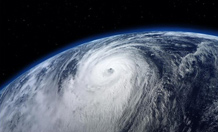
There are more lead authors on the report from Exeter than from any other city. Globe image courtesy of Shutterstock.
Exeter climate scientists contribute to IPCC report
University of Exeter researchers have had a high profile role in creating the world’s most comprehensive report on climate change.
A combined total of 12 researchers from the University and the Met Office have been selected as lead authors of the Intergovernmental Panel on Climate Change (IPCC) 5th Assessment Report (AR5) – a greater number than from any other region.
The Working Group I (WGI) Summary for Policymakers was published on Friday 27th September 2013 and is the six yearly update on the state of the Earth’s climate, covering the physical science basis of climate change. It is considered the main source of information for governments and industry and is a crucially important means for climate scientists and mathematicians to inform policy.
University of Exeter WGI authors:
Prof Matthew Collins (coordinating lead author of chapter on Climate Projections)
Prof Pierre Friedlingstein (lead author on chapter on Climate Projections & the Summary for Policymakers)
Prof David Stephenson (lead author on chapter on Regional Climate Change)
Prof Peter Cox (lead author on chapter on Evaluation of Climate Models)
Professor Cox said: “This latest IPCC report surpasses even the previous four in terms of its breadth and rigour. It confirms that the climate is changing, that carbon dioxide emissions from human activities are the dominant reason for this, and that we are running out of time to avoid the 2 degrees of global warming that is the stated aim of international climate negotiations.
“However, the report also shows that the climate system still has the ability to surprise us in many ways. The rate of global warming appears to have slowed recently, but other changes in the climate system such as the melting of sea-ice and the Greenland and Antarctic ice-sheets are occurring even faster than expected, and the financial losses due to weather and climate extremes struck an all-time high in 2012.
“The challenge for climate science is to understand the links between the many observed changes in the climate system. The challenge for humanity is to act on the robust findings of the IPCC and get serious about reducing carbon dioxide emissions.”
Professor Collins, Joint Met Office Chair in Climate Change at the University of Exeter said: “Further emissions of greenhouse gases will cause further global warming. The Arctic will warm most rapidly and the land will warm more than the ocean. There will be more hotter and fewer cold days. Mid-latitude areas that currently experience high rainfall will get more. Sea levels will continue to rise and snow and ice will melt back. If we follow the highest scenario of future greenhouse gases, the Arctic is expected to be ice-free before the middle of the 21st century.
Avoiding 2 degrees of warming since preindustrial times will be very tough. We have already ‘spent’ more than two thirds of the CO2 emissions that we can afford to spend.”
More information is available on the IPCC website: http://www.ipcc.ch/
Date: 30 September 2013
